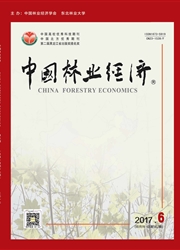

 中文摘要:
中文摘要:
以要素禀赋论为理论基础,根据社会经济发展水平,将我国分为发达、中等、落后三个区域,从中选出不同发展程度的7个省份作为分析样本。同时选取自然资源禀赋、劳动力资源禀赋、科技和资本投入、贸易环境等8个要素禀赋指标,建立环保产业竞争力评价模型。通过逐步回归方法,对模型进行优化收敛,排除相关性较差变量,从而找出对环保产业竞争力影响程度最为显著的要素禀赋指标。根据回归分析结果,结合这些要素禀赋条件和环保产业在我国发展的现实状况,总结出现阶段要素禀赋对我国环保产业影响的特殊现象,并通过探究这些现象产生的原因,得出了现阶段我国环保产业存在着对劳动力依赖程度高、技术转化效率和资本收益率低等现实问题这一结论,对未来有针对性的提高环保产业竞争力起到了现实指导意义。
 英文摘要:
英文摘要:
With factor endowment as theoretic basis, this article divides China into three areas, the developed, the medium and the backward, of which 7 provinces will be selected as analysis samples. Meanwhile, we adopt 8 factor endowment indicators, including natural resources endowment, labor endowment of resources, input to technology and capital investment, trade environment, etc to build model of environment protection industry competitive strength. Through stepwise regression method, we conduct optimization convergence to exclude variables with poor relevance and find factor endowment indicators with the most outstanding effect to environment protection industry competitive strength. According to the result of regression analysis and in consideration of these factor endowment conditions and the actual situations of environment protection industry development in China, we have summarized the special phenomenon that the factor endowments have impact on Chinese environment protection industry at the current stage. By analyzing the causes of these phenomena, we conclude high dependence on labor, low technology transformation efficiency and capital-cost efficiency and other real problems. As a result, this paper is important as guidance for targeted improvement of environment protection industry competitive strength in future.
 同期刊论文项目
同期刊论文项目
 同项目期刊论文
同项目期刊论文
 期刊信息
期刊信息
